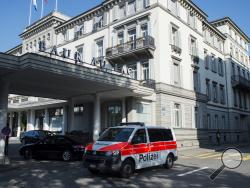BERN, Switzerland (AP) — For months, American and Swiss investigators worked in secret to prepare for the raids that would shake the soccer world.
They knew that the moment to strike would come when FIFA, the sport's governing body, held its annual congress in Zurich, gathering all of its top officials — including the main suspects in a far-reaching U.S. corruption probe.
Any leak could have given the game away, allowing international soccer officials to scramble out of Switzerland or time to destroy important evidence before authorities could seize it.
"It was a months-long planning. It was quite intense to try to find out what is the best moment," Andre Marty, spokesman for the Swiss attorney general's office, told The Associated Press late Wednesday, hours after the raids. "It was exactly today that most of the people of interest to the U.S. investigation and to the Swiss investigation are still in Switzerland."
The dual investigations have shaken FIFA, which has been dogged by corruption claims. FIFA president Sepp Blatter has sought to manage the allegations, going so far as to file a criminal complaint against "unknown persons" last November. That move followed then-FIFA ethics prosecutor Michael Garcia's protest at how FIFA handled his investigation into wrongdoing during the votes to host of the 2018 and 2022 World Cup — which went to Russia and Qatar.
Marty insisted that FIFA wasn't tipped off that law enforcement officials would strike on Wednesday, conducting dawn arrests at the luxury Baur au Lac Hotel and raiding FIFA's Zurich headquarters to seize electronic and paper documents.
"It was quite important to have this coordination between the arrests on the one side for the American procedure, and the other side to get into FIFA and get all of the interesting data and information that we are looking for," he said.
For their part, Swiss prosecutors decided to act after the complaint from FIFA was backed up by what Marty described as "rather interesting bank documents" that investigators had obtained in recent months.
"This led to the fact that we were convinced that we have to proceed with these criminal procedures," he told the AP.
Prosecutors planned on Thursday to interview 10 members of the FIFA executive committee who were already members in 2010, when the vote on who was to host the 2018 and 2022 World Cups occurred, he said. Marty declined to name them, but a review of the FIFA executive committee members present in 2010 and now produces 10 names: Michel D'Hooghe of Belgium, Jacques Anouma of Ivory Coast, Marios Lefkaritis of Cyprus, Angel Maria Villar of Spain, Senes Erzik of Turkey, Worawi Makudi of Thailand, Issa Hayatou of Cameroon, Hany Abo Rida of Egypt, Vitaly Mutko of Russia and Rafael Salguero of Guatemala.
Meanwhile, U.S. prosecutors are going after 14 people — nine current and former FIFA officials, four sports marketing executives and an accused intermediary — in corruption allegations spanning more than two decades and involving sums in excess of $100 million. Seven were taken into custody in Zurich on Wednesday.
Unlike their U.S. counterparts, Swiss prosecutors aren't yet investigating the possibility of bribery in the allocation of the 2018 and 2022 World Cups. Instead, their probe — dubbed 'Darwin' — is examining whether members of the executive committee acted in the best interest of FIFA.
Blatter isn't one of those under investigation in the Swiss probe, Marty said.
"As we are speaking Mr. Sepp Blatter is neither under investigation nor is he one of the persons we would like to talk to tomorrow," he said. But he added that this could change.
Switzerland has been trying in recent years to shed its reputation as a location for secret financial dealings; for example, it now cooperates with other countries investigating alleged tax cheats suspected of hiding money in Swiss accounts.
"Be assured that the office of the attorney general won't hesitate to investigate (anyone)," said Marty.
"With these criminal procedures we are trying to underline the efforts of the Swiss authorities in the fight against corruption — international corruption even — and money laundering," he said.

